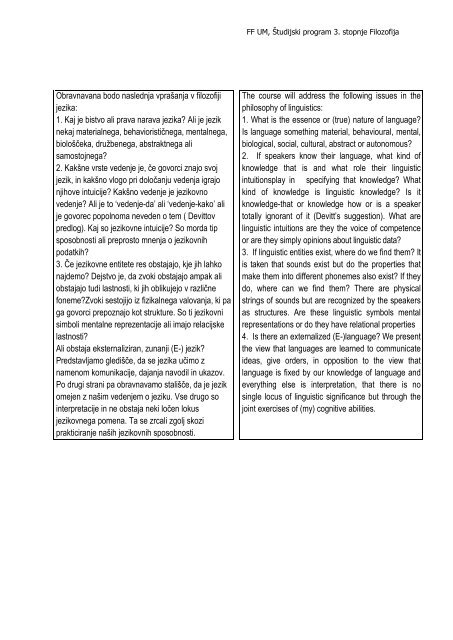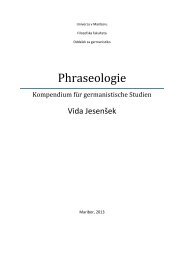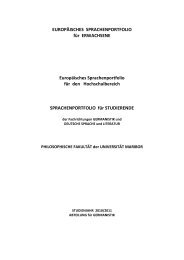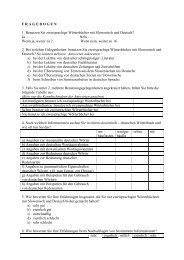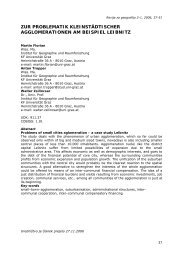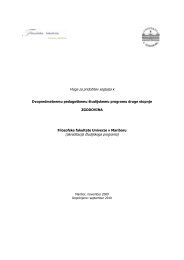učni načrt predmeta / subject specification - Filozofska fakulteta ...
učni načrt predmeta / subject specification - Filozofska fakulteta ...
učni načrt predmeta / subject specification - Filozofska fakulteta ...
You also want an ePaper? Increase the reach of your titles
YUMPU automatically turns print PDFs into web optimized ePapers that Google loves.
Obravnavana bodo naslednja vprašanja v filozofiji<br />
jezika:<br />
1. Kaj je bistvo ali prava narava jezika? Ali je jezik<br />
nekaj materialnega, behaviorističnega, mentalnega,<br />
biološčeka, družbenega, abstraktnega ali<br />
samostojnega?<br />
2. Kakšne vrste vedenje je, če govorci znajo svoj<br />
jezik, in kakšno vlogo pri določanju vedenja igrajo<br />
njihove intuicije? Kakšno vedenje je jezikovno<br />
vedenje? Ali je to ‘vedenje-da’ ali ‘vedenje-kako’ ali<br />
je govorec popolnoma neveden o tem ( Devittov<br />
predlog). Kaj so jezikovne intuicije? So morda tip<br />
sposobnosti ali preprosto mnenja o jezikovnih<br />
podatkih?<br />
3. Če jezikovne entitete res obstajajo, kje jih lahko<br />
najdemo? Dejstvo je, da zvoki obstajajo ampak ali<br />
obstajajo tudi lastnosti, ki jih oblikujejo v različne<br />
foneme?Zvoki sestojijo iz fizikalnega valovanja, ki pa<br />
ga govorci prepoznajo kot strukture. So ti jezikovni<br />
simboli mentalne reprezentacije ali imajo relacijske<br />
lastnosti?<br />
Ali obstaja eksternaliziran, zunanji (E-) jezik?<br />
Predstavljamo gledišče, da se jezika učimo z<br />
namenom komunikacije, dajanja navodil in ukazov.<br />
Po drugi strani pa obravnavamo stališče, da je jezik<br />
omejen z našim vedenjem o jeziku. Vse drugo so<br />
interpretacije in ne obstaja neki ločen lokus<br />
jezikovnega pomena. Ta se zrcali zgolj skozi<br />
prakticiranje naših jezikovnih sposobnosti.<br />
FF UM, Študijski program 3. stopnje Filozofija<br />
The course will address the following issues in the<br />
philosophy of linguistics:<br />
1. What is the essence or (true) nature of language?<br />
Is language something material, behavioural, mental,<br />
biological, social, cultural, abstract or autonomous?<br />
2. If speakers know their language, what kind of<br />
knowledge that is and what role their linguistic<br />
intuitionsplay in specifying that knowledge? What<br />
kind of knowledge is linguistic knowledge? Is it<br />
knowledge-that or knowledge how or is a speaker<br />
totally ignorant of it (Devitt’s suggestion). What are<br />
linguistic intuitions are they the voice of competence<br />
or are they simply opinions about linguistic data?<br />
3. If linguistic entities exist, where do we find them? It<br />
is taken that sounds exist but do the properties that<br />
make them into different phonemes also exist? If they<br />
do, where can we find them? There are physical<br />
strings of sounds but are recognized by the speakers<br />
as structures. Are these linguistic symbols mental<br />
representations or do they have relational properties<br />
4. Is there an externalized (E-)language? We present<br />
the view that languages are learned to communicate<br />
ideas, give orders, in opposition to the view that<br />
language is fixed by our knowledge of language and<br />
everything else is interpretation, that there is no<br />
single locus of linguistic significance but through the<br />
joint exercises of (my) cognitive abilities.


